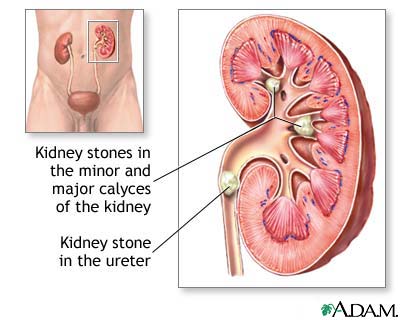Cystinuria - definition, diagnosis, symptoms and treatment

What is Cystinuria and Definition
Cystinuria is an inherited genetic disorder in which the KIDNEYS do not properly reabsorb amino acids collectively called cystine. The excessive excretion of cystine to the URINE causes crystalline calcifications, commonly called stones, to form in the kidneys, ureters, and BLADDER. Most people learn they have the GENE MUTATION, which is autosomal recessive, during analysis of the calcifications. Doctors have known of cystine calcifications in the bladder since the early 1800s. Researchers identified cystinuria as hereditary in the early 1900s and discovered the first effective medication to reduce the formation of cystine calcifications, penicillamine, in the early 1960s. In the late 1990s researchers identified the mutated genes as SLC3A1 on CHROMOSOME 2 and SLC7A9 on chromosome 19.
Symptoms of Cystinuria and Diagnosis
Pain in the side or back, often on only one side, is the typical symptom of an occlusive (blocking) calcification. The urine may also smell of sulfur (rotten eggs) The diagnostic path may include ULTRASOUND, COMPUTED TOMOGRAPHY (CT) SCAN, or MAGNETIC RESONANCE IMAGING (MRI) of the abdomen to visualize the calcifications. Laboratory analysis of fragments filtered from the urine identifies their composition as cystine, confirming the diagnosis. Most of the time the stones pass on their own, though the process often is painful. Doctors usually prescribe ANALGESIC MEDICATIONS for PAIN relief during the time a stone is passing. Occasionally treatments such as EXTRACORPOREAL SHOCK WAVE LITHOTRIPSY (ESWL), which uses high-frequency sound waves to break the calcification into fragments, or surgery (percutaneous nephrolithotomy) are necessary to remove an obstructive and impacted stone.
Cystinuria Treatment
Because there are as yet no treatments to correct the gene mutation, the cystine calcifications recur throughout life. Penicillamine, which binds with cystine in the urine to form a compound that easily dissolves in water, remains the medication urologists most often prescribe to reduce the formation of stones. The urologist may also prescribe medications to increase the alkalinity of the urine, such as potassium citrate, which helps dissolve cystine. It is important for people who have cystinuria to drink enough water to maintain good urine output, which dilutes the concentration of cystine and pass it from the body before it forms calcifications. Other lifestyle modifications include decreasing dietary sodium and protein consumption (protein is the source of the cystine).
See also ENDOSCOPY; FANCONI’S SYNDROME; GENE THERAPY; HYPEROXALURIA; INHERITANCE PATTERNS; NEPHROLITHIASIS; SURGERY BENEFIT AND RISK ASSESSMENT; UROLITHIASIS.